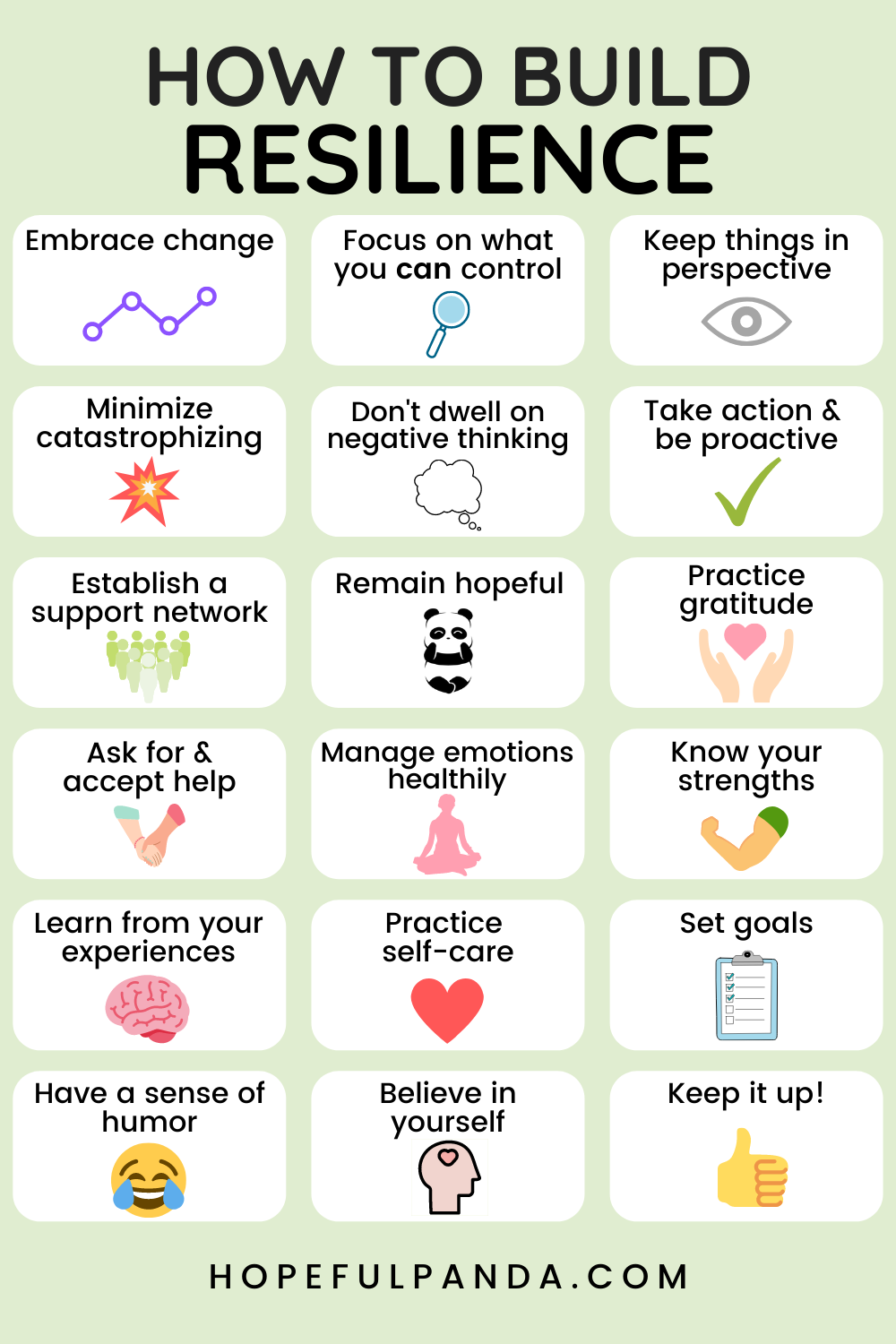The Resilience Mindset: Overcoming Adversity And Improving Mental Health

Table of Contents
Understanding the Resilience Mindset
Defining Resilience
Resilience is the ability to bounce back from adversity, adapt to change, and thrive despite challenges. It's not about avoiding hardship, but about navigating it effectively and emerging stronger on the other side. Resilient individuals demonstrate remarkable adaptability and a positive outlook, even when facing significant setbacks. Think of an athlete recovering from a serious injury or an entrepreneur overcoming business failures – these are prime examples of resilience in action.
- Ability to recover quickly from difficulties: Resilient people don't dwell on setbacks; they learn from them and move forward.
- Adaptability to changing circumstances: They readily adjust to new situations and embrace change as an opportunity for growth.
- Positive outlook in the face of setbacks: Maintaining a hopeful attitude, even in challenging times, is crucial for resilience.
- Strong problem-solving skills: They possess the ability to analyze problems, develop effective solutions, and take action.
- Effective stress management techniques: They have healthy coping mechanisms to manage stress and prevent burnout.
The Science Behind Resilience
The science of resilience is rooted in neuroplasticity – the brain's incredible ability to reorganize itself by forming new neural connections throughout life. Positive emotions, such as gratitude, joy, and hope, play a crucial role in buffering the negative effects of stress. When we experience positive emotions, our brains release neurochemicals that promote well-being and enhance our ability to cope with challenges. Furthermore, strong social support networks act as a powerful buffer against adversity, providing emotional support, practical assistance, and a sense of belonging.
- Neuroplasticity: This highlights the brain's capacity to change and adapt in response to experiences, making resilience a skill that can be learned and strengthened.
- The role of positive emotions in buffering stress: Positive emotions help regulate stress hormones and promote emotional regulation.
- The impact of social support on resilience: Having a strong support system significantly enhances our capacity to overcome adversity.
Practical Strategies for Building Resilience
Cultivating Self-Compassion
Self-compassion, the practice of treating yourself with kindness, understanding, and acceptance, is fundamental to building resilience. Self-criticism and negative self-talk are major obstacles to resilience, fueling feelings of inadequacy and hindering our ability to cope with challenges. Cultivating self-compassion involves acknowledging your suffering, treating yourself with the same kindness you would offer a friend, and recognizing that you are not alone in your struggles.
- Practice self-forgiveness: Let go of past mistakes and learn from them without dwelling on self-blame.
- Challenge negative self-talk: Replace negative thoughts with more balanced and compassionate ones.
- Treat yourself with the same kindness you would offer a friend: Extend compassion and understanding to yourself, just as you would to someone you care about.
Developing Effective Coping Mechanisms
Developing a range of healthy coping mechanisms is vital for managing stress and adversity. These mechanisms provide tools to regulate emotions, reduce stress, and build inner strength. Experiment with different techniques to find what works best for you.
- Mindfulness and meditation: These practices help calm the mind, increase self-awareness, and improve emotional regulation.
- Exercise and physical activity: Physical activity releases endorphins, reduces stress, and boosts mood.
- Spending time in nature: Connecting with nature has been shown to reduce stress and improve mental well-being.
- Connecting with supportive friends and family: Strong social connections provide emotional support and a sense of belonging.
- Journaling and expressive writing: Writing down your thoughts and feelings can help process emotions and gain perspective.
- Seeking professional help when needed: Don't hesitate to seek support from a therapist or counselor if you're struggling to cope.
Reframing Negative Thoughts
Cognitive restructuring involves identifying and challenging negative thought patterns. Negative thoughts often distort reality, making challenges seem insurmountable. By learning to identify and reframe these thoughts, you can cultivate a more positive and realistic outlook.
- Identifying cognitive distortions: Learn to recognize common cognitive distortions like catastrophizing, all-or-nothing thinking, and overgeneralization.
- Replacing negative thoughts with more realistic and positive ones: Challenge negative thoughts by asking yourself if they are truly accurate and replacing them with more balanced perspectives.
- Focusing on solutions instead of problems: Shift your focus from dwelling on problems to actively seeking and implementing solutions.
Maintaining a Resilience Mindset Long-Term
The Importance of Self-Care
Maintaining a resilient mindset requires ongoing self-care. Self-care isn't selfish; it's essential for your mental and physical well-being. Prioritizing self-care ensures you have the energy and resources to navigate challenges effectively.
- Prioritizing sleep: Aim for 7-9 hours of quality sleep per night.
- Maintaining a healthy diet: Nourish your body with healthy foods to support your physical and mental health.
- Engaging in regular physical activity: Exercise is a powerful tool for stress reduction and mood enhancement.
- Setting boundaries: Learn to say no to commitments that drain your energy and prioritize your well-being.
Seeking Support
Building a strong support network is crucial for maintaining long-term resilience. Don't hesitate to reach out for help when you need it. Social support provides emotional comfort, practical assistance, and a sense of belonging.
- Building strong social connections: Cultivate meaningful relationships with friends, family, and community members.
- Seeking therapy or counseling when needed: Professional help can provide guidance, support, and coping strategies.
- Joining support groups: Connecting with others who share similar experiences can provide a sense of community and validation.
Conclusion
Developing a resilience mindset is a journey, not a destination. By understanding the principles of resilience, practicing self-compassion, employing effective coping mechanisms, and prioritizing self-care, you can significantly improve your mental health and navigate life's challenges with greater strength and confidence. Embrace the power of a resilience mindset today and unlock your potential to overcome adversity and thrive. Start building your resilience now – your mental well-being will thank you for it. Begin your journey towards a stronger, more resilient you by incorporating these strategies into your daily life. Your improved mental well-being is within reach!

Featured Posts
-
 Aghatha Krysty Tewd Llhyat Bfdl Aldhkae Alastnaey
May 20, 2025
Aghatha Krysty Tewd Llhyat Bfdl Aldhkae Alastnaey
May 20, 2025 -
 Agatha Christies Poirot Characters Cases And Critical Analysis
May 20, 2025
Agatha Christies Poirot Characters Cases And Critical Analysis
May 20, 2025 -
 Tyler Bate Returns To Wwe Raw Analysis And Predictions
May 20, 2025
Tyler Bate Returns To Wwe Raw Analysis And Predictions
May 20, 2025 -
 Overnight Storm Chance And Mondays Severe Weather Outlook
May 20, 2025
Overnight Storm Chance And Mondays Severe Weather Outlook
May 20, 2025 -
 Todays Nyt Mini Crossword Answers April 25th
May 20, 2025
Todays Nyt Mini Crossword Answers April 25th
May 20, 2025
